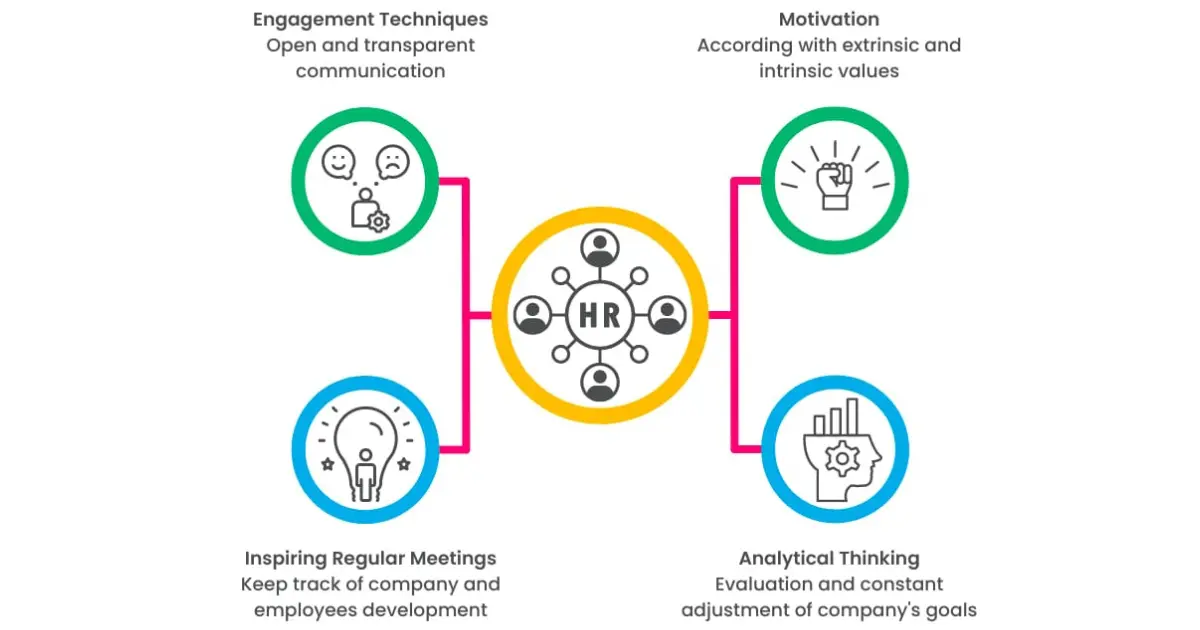How Can HR Drive Sustainability Initiatives in the Organization?
Ipsita P | 12-14-2023 | 09 min read

Let Us First Understand What is Sustainability -
Sustainability is a significant concern in our collective consciousness, especially as we look to the future and seek to avoid the effects of inaction. This issue is being discussed in many different areas, but at this point, it's more than just a discussion. Concrete, proactive steps are needed. This urgency has moved the debate on sustainability from conversation to action, especially in the workplace. HR leaders recognize this need and embrace their role as critical partners in developing and implementing sustainability strategies within their organizations.
Sustainability, in its broadest sense, embodies the principle of meeting the needs of the present without compromising the ability of future generations to meet their own needs. It represents a comprehensive approach that balances environmental health, social equity, and economic viability.
Sustainability in the Organizational Context
Sustainability involves responsibly managing environmental, social, and economic impacts while ensuring long-term profitability. In a corporate environment, it is essential to integrate environmentally friendly practices, social responsibility, and economic viability into the organization's operations.
Three Pillars of Sustainability -
Sustainability is a complex concept. The focus is on meeting the needs of the present without compromising the ability of future generations to meet their own needs. The three pillars of sustainability that are most interesting to us are Economic, Environmental, and Social. More informally, these pillars are Profit, Planet, and People.
Sustainability within an organization represents a commitment to operating a business in a way that balances economic growth, social responsibility, and environmental protection. This embodies the company's holistic approach to meeting the needs of today without compromising the ability of future generations to meet their own needs. This includes embedding sustainable practices into every aspect of company operations, from sourcing and production to marketing and employee engagement. The aim is to minimize the impact on the environment by reducing waste, conserving resources, and using environmentally friendly technologies. At the same time, this includes promoting a culture of social responsibility through promoting diversity, ensuring fair labor practices, and making a positive contribution to the communities in which the organization operates. In economic terms, it means maintaining profitability while prioritizing long-term sustainability. This includes investing in renewable energy, ethical supply chains, and innovations aimed at reducing a company's carbon footprint. Achieving sustainability within an organization requires a strategic and systematic approach that integrates these principles into its core values, policies, and decision-making processes.
The Impact of Sustainability in Business -
Sustainability has evolved from an ethical consideration to a strategic imperative, reshaping business environments around the world. The impact is multi-dimensional and impacts operations, reputation, and financial performance. Sustainability is not just a moral choice. This has proven to be a critical success factor in today's competitive market.
As per Forbes, 90% of business leaders think sustainability is important. However, only 60% of companies have sustainability strategies.
In 2012, the United Nations announced 17 sustainability goals for the world to achieve by 2030. These sustainability goals impact every level, from large governments to businesses to ordinary citizens. Many companies translate these 17 goals into session-level goals for business activities. This comes at a time when listed companies are required to disclose publicly information about their environmental, social, and governance (ESG) actions, with listed companies held accountable for the impact of their actions on sustainability. This means that we must also take responsibility for sustainability. This makes these practices more critical than ever.

Current facts and data support this change. For example, companies that actively engage in sustainability practices see tangible benefits. Research shows that sustainable companies achieve better financial performance. According to a report by Deloitte, companies that focus on sustainability outperform their competitors in the stock market. Consumer preferences are also evolving, and research shows that the majority of consumers prefer products and services from companies that are environmentally and socially responsible.
Moreover, sustainability is about more than just good intentions. It's about reducing risk. Companies that neglect sustainability can face fines, supply chain disruptions due to resource constraints, and reputational damage. As environmental regulations tighten around the world, companies with a focus on sustainability gain a competitive advantage by meeting evolving standards and reducing operational risk.
A workforce that is skilled in sustainable practices and solutions can help organizations achieve their sustainability goals, improve their reputation, and reduce their environmental impact, all while maintaining profitability.
HR professionals are responsible for aligning the organization's values and goals with environmentally conscious initiatives. This involves developing and implementing policies that foster sustainability, from green procurement practices and flexible work conditions(A report by Landmark stated that hybrid working can reduce carbon emissions by 70%!) to reduce carbon footprint to sustainable talent acquisition strategies.
Benefits of Sustainability in the Workforce:
Workforce sustainability has many benefits for both companies and employees. For businesses, sustainability practices not only lead to cost savings through reduced energy and resource consumption but also a positive reputation and increased customer loyalty. For employees, sustainability efforts lead to pride in their work and a sense of purpose as they contribute to the larger goal of creating a more sustainable future. Here are some benefits:
- Enhanced Employee Engagement: Sustainability efforts create a sense of purpose and pride among employees. Involving them in meaningful projects that contribute to environmental or social causes fosters a deeper connection to their work and organization. Employees are more likely to feel motivated and committed to a company that prioritizes sustainability.
- Attracting and Retaining Talent: Companies with strong sustainability practices are more attractive to potential employees, especially younger employees. Millennial and Gen Z workers, in particular, prefer working for organizations that are committed to social and environmental responsibility. Therefore, sustainability initiatives can help you attract top talent and retain valuable employees.
- Improving Health and Well-Being: Sustainability often includes efforts to prioritize the health and well-being of employees. For example, promoting a green office environment with better air quality, access to natural light, and space for physical activity can have a positive impact on employee health and productivity.
- Innovation and Creativity: Sustainability efforts foster innovation and creative problem-solving. Employees are often motivated to find innovative solutions that support sustainability goals, creating a culture of continuous improvement and creativity within the workforce.
- Cost Reduction and Efficiency: Implementing sustainable practices such as reducing energy consumption and waste can lead to cost savings for companies. Increased efficiency contributes to lower operating costs and has a positive impact on the company's bottom line.
How to Implement a Successful Sustainability Programme?
Successfully implementing a sustainability program requires a strategic and systematic approach that involves the entire organization. The three key areas are communication, education, and motivation.
Communication
Communication is essential in any business, whether it's face-to-face or via email. Internal communication is vital for all HR managers to engage employees in sustainable practices. This includes everything from lights out to volunteering. A sustainability portal or internal newsletter can highlight the achievements of both employees and the company as a whole.
Education
Communicating sustainability goals to employees not only educates them about the sustainability issues at hand but also shows employees that the company is committed to reducing its environmental impact.
Motivation
Providing rewards, recognition, and accountability can lead to team member retention while developing a more engaged workforce. Finding new solutions, such as offering rewards programs, not only provides tangible and measurable business benefits but also ensures that team members remain actively involved and hands-on with the company. Introducing environmentally focused rewards can support organizational improvement, inspire passion, reduce a company's environmental impact, and save money while demonstrating the importance of ecological sustainability, which can make teamwork rewarding.
Role of HR in Sustainability -
Human Resources (HR) plays a critical role in promoting organizational sustainability by embedding environmentally friendly and socially responsible practices into the fabric of the workplace. Human resources departments help advance sustainability efforts by promoting policies that embed these values into the company's culture. We help shape our workforce by hiring people who are aligned with our organization's sustainability goals and providing ongoing training to instill a sense of ownership and commitment to these efforts. Additionally, Human Resources departments encourage employees to actively contribute to sustainability goals and contribute to the design of performance indicators to integrate these goals into evaluation and reward systems through effective communication and education. Human Resources departments engage employees at all levels to promote an understanding of the importance of sustainable practices and promote a greener and more socially responsible workplace, encouraging active employee participation.
More business leaders are increasing investments to strengthen their talent strategies, build HR functions, and ensure access to and retention of key talent. Sustainability depends on the success of their timely interventions.

How Do HR and Sustainability Connect?
Human resources (HR) and sustainability intersect at the core of a company's values and operations, working together to drive a culture of responsibility and purpose. Human resources acts as a bridge to turn sustainability efforts into actionable strategies by aligning hiring practices, training programs, and performance evaluations with environmental and social goals. It plays a crucial role in recruiting and developing talent that aligns with the organization's sustainability philosophy and fosters employee engagement through education and advocacy for sustainable practices. Additionally, HR departments shape the workplace culture by embedding sustainability into policies, values, and daily operations, ensuring that environmental and social responsibility is an integral part of the company's DNA. Through these initiatives, HR can act as a catalyst to help employees embrace sustainability as a collective responsibility, thereby contributing to a more ethical, resilient, and forward-looking organization.
Why is Sustainability in HR Important?

➔ Employee Engagement and Motivation: Incorporating sustainability into HR initiatives fosters employee commitment. Incorporating meaningful sustainability programs increases morale, increases job satisfaction and improves overall employee motivation and productivity.
➔ Encouraging Analytical Thinking: By incorporating sustainability into your HR practices, you can encourage employees to take a more analytical approach to problem-solving. This approach helps identify inefficiencies, evaluate processes, and find innovative solutions, resulting in increased organizational efficiency and effectiveness. Analytical thinking becomes an integral part of the decision-making process, leading to more strategic and forward-looking solutions in all areas.
➔ Inspiring Regular Meetings: Regular meetings focused on sustainability initiatives within the HR department foster collaboration and exchange of ideas among employees. These sessions provide a platform to discuss ongoing sustainability projects, share progress, address challenges, and develop new ideas. These meetings allow employees from different departments to bring diverse perspectives to the table and foster a culture of collaboration and collective problem-solving.
How to Promote Sustainability in HR?
Achieving sustainability in the HR department requires a concrete and actionable plan. Here are five ways HR departments can promote sustainability in companies.
1. Aligning Corporate Policies with Sustainability Goals:
- Assessing and Integrating : Start by determining a company's sustainability goals and integrating them into your human resources policies. Ensure HR policies reflect the organization's commitment to sustainability, including areas such as hiring, performance appraisal, training, and employee engagement.
- Policy formulation : Develop concrete policies that prioritize sustainability. Incorporating environmentally friendly initiatives into office operations, promoting diversity and inclusion, promoting social responsibility initiatives, etc., make sure these policies are effectively communicated throughout the organization.
2. Attract Sustainability-Minded Talent:
- Adjust recruitment strategy : Adjust recruitment strategy to attract talent that aligns with the organization's sustainability values. Highlight the company's commitment to sustainability in job descriptions, career portals, and recruitment processes.
- Showcase sustainability efforts : Share success stories and ongoing sustainability projects within the organization to attract candidates who are passionate about those efforts.
3. Integrate Sustainability Goals into Onboarding:
- Incorporate sustainability training : Incorporate training modules that highlight the company's sustainability goals, practices, and expectations during the onboarding process. This helps new employees understand the organization's commitment to sustainability from the start.
- Resource Provision : Provides resources and information on how to actively engage employees in sustainability initiatives and foster a sense of ownership and commitment from the start of employment.
4. Empower Employees to Take Action:
- Encourage the exchange of ideas : Establish a platform where employees can share ideas, suggestions, and initiatives related to sustainability. This may include establishing dedicated forums, committees, suggestion boxes, etc.
- Recognition and Rewards : Recognize and reward employees for their contributions to sustainability. Highlight and celebrate successes and reinforce a culture of sustainable behavior.
5. Minimize Paper Documentation:
- Digital Transformation : Reduce paper consumption by transforming HR processes to digital platforms. Introduce electronic documentation for personnel procedures such as digital onboarding, performance reviews, record keeping, etc.
- Promote sustainable practices : Promote a paperless environment by encouraging email communication, using digital tools for file sharing and collaboration, and minimizing unnecessary document printing.
Conclusion
In summary, the symbiotic relationship between human resources (HR) and sustainability is ushering in an era of transformation in the workplace. There's no denying that HR plays a central role in driving sustainability initiatives. HR departments can improve organizational structure by aligning company policies, attracting like-minded talent, integrating sustainability into onboarding, empowering employees, and minimizing paper usage. The future of work is all about sustainability, and HR is at the forefront of this evolution. His commitment to embedding sustainability not only ensures the organization's success but also contributes to broader social and environmental impact. As HR continues to advocate for sustainability, workplaces are moving toward a more ethical, resilient, and positive perspective. The path to talent sustainability is for more than just companies. It's a commitment to shaping a better world for future generations.
Popular blogs

Strategies for Effective Team Building and Leadership
The success of your organization depends on teamwork. Effective project completion requires teamwork; no one in...

Top 10 Benefits of Good Habits
Habits are recurring patterns of behavior that people do without realizing it or trying. Most habits are involu...

How Travel Fosters Meaningful Friendships
Getting out of your comfort zone and experiencing new things with others is a common part of traveling. People ...
Submit a Comment